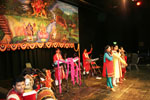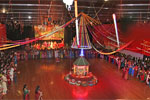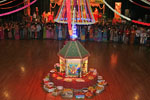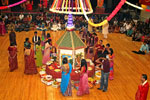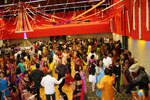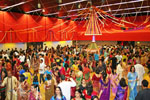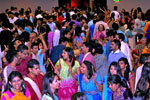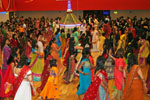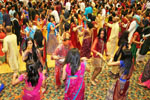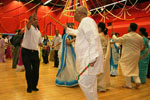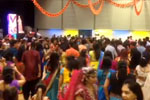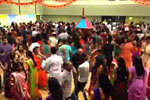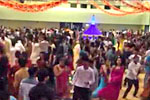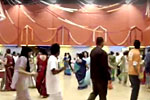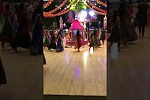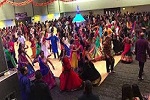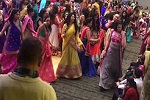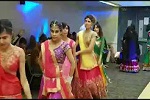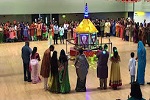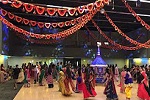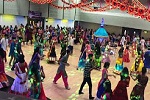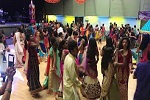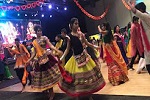-

ADVANCE BOOKING
Now you can buy your season tickets in advance... -
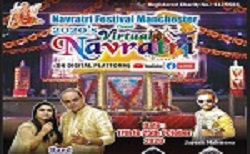
PERFORMING GROUP
Get ready for Navratri event 2020, with Band of Mitesh Bhatt & Neema Bhatt ... -

ABOUT US
Organising and managing the Navratri Festival for the Indian Community in United Kingdom... -

VIDEO & PHOTO GALLERY
Have a look at all the Video & Photo Gallery collection of Navratri Festival event. -

DOWNLOAD GARBA LYRICS
Now you can download Aarti & famous Navratri Garba Songs Lyrics -

GARBA PLAYLIST
Now you can listen to the most famous Navratri Garba & Dandiya Raas Songs...
EVENT DETAILS
-

Date & Time
NAVRATRI 2019
Pre Navratri : 27-09-2019 & 28-09-2019
29th September to 8th October 2019
7.30 PM TO 12.30 AM
DOWNLOAD AARTI & GUJARATI GARBA LYRICS
-
Maa Jaya Adhya Shakti Aarti Lyrics
-
Ek Vaar Bolu Ke Gujarati Garba Lyrics
-
Tara Vina Shyam Mane Gujarati Navratri Garba Lyrics
-
Amba Abhay Pad Dayani Re Gujarati Garba Lyrics
-
Darshan Aapo Ne Maata Gujarati Garba Lyrics
-
Adhya Shakti Tujne Namu Gujarati Garba Lyrics
GARBA PLAYLIST
-
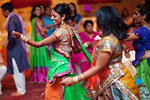
-
Discover Gujarati Garba
• Trending Now / New Releases
• Top Albums of the Week
• All-Time Favorite Albums
• Top Tracks of the Week
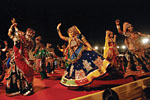
-
Discover Gujarati Ras Garba
• Trending Now / New Releases
• Top Albums of the Week
• All-Time Favorite Albums
• Top Tracks of the Week
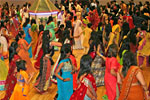
-
Discover Non-stop Garba Songs Video
• The most Top Trending Navratri Gujarati Gabra Songs Video Collection
-
Discover Other Famous Gujarati Garba
• Falguni Pathak Non-stop Raas Garba
• Navrang Non-stop Raas Garba
• Special Navratri Non-stop Raas Garba
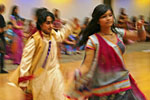
PERFORMING GROUP
-
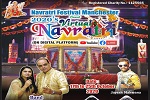
NAVRATRI 2020
17th October to 25nd October 20
Band: Mitesh Bhatt & Neema Bhatt -
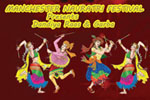
NAVRATRI 2015
13th October to 22nd October 2015
Band: Mitesh Bhatt & Neema Bhatt -
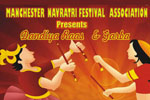
NAVRATRI 2014
25th September to 4th October 2014
Band: Mitesh Bhatt & Neema Bhatt -
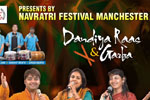
NAVRATRI 2012
16th October to 23rd October 2012
Band: Harshit Mehta -
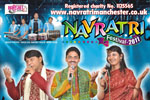
NAVRATRI 2011
28th September to 8th October 2011
Band: Harshit Mehta -
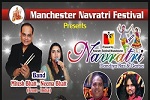
NAVRATRI 2018
9th October to 20nd October 2018
Band: Mitesh Bhatt & Neema Bhatt
TICKETS
Now you can purchase advance season tickets.
Purchase Tickets from
• ALANKER – RUSHOLME MANCHESTER |
– 0161 256 3780 |
• HOUSE OF RAJA – BOLTON |
– 01204 532 890 |
• ASM ASHTON-UNDER-LYNE |
– 0161 339 4744 |
• MRS. MADHURIKABEN PATEL |
– 0161 428 2209 |
• MR. HEMANTKUMAR PATEL |
– 077 6837 1985 |
• MR. MAHESHBHAI HATHI |
– 079 8441 1103 |
• MR. BHAGUBHAI THAKER |
– 0161 432 8570 |
ABOUT US
Aim
Organising and managing the Navratri Festival for the Indian Community in the North West region of United Kingdom where by “BRINGING THE COMMUNITY TOGETHER."
Background
The Navratri Festival has been running since mid 1980’s. The Festival has been organised at various venues by each sect of the Indian Community in and around Manchester.
In 1993 a decision to jointly organise the Navratri Festival for the entire Indian Community of the North West was taken. The event was held at Platt fields in Manchester.
The Festival has been held since 1993 and has grown from strength to strength with the support of the entire Indian Community members both young and old who attend the festival every year.
Who are we
A Registered charity under the leadership of the Trustee who with Committee members and volunteers organise the annual Navratri Festival.
Committee Members
• Bhagubhai Thakker
• Madhurikaben Patel
• Sunil Chauhan
• Hemant Patel
• Dilip Modha
• Mahesh Hathi
• Pravin Arjan
Volunteers
A team of volunteers from the Indian community and also the Indian Student Association of the Manchester University help prior to and during the festival.
ABOUT NAVRATRI
Navratri is one of the most popular and widely celebrated Hindu festivals in many parts of India. Navratri, meaning 'nine nights'. The word Navratri literally means nine nights in Sanskrit; Nava meaning Nine and Ratri meaning nights. During these nine nights and ten days, nine forms of shakti/Devi i.e. female divinity are worshipped. It's a festival full of worship and dance. The festival culminates with Dussehra, the victory of good over evil, on the tenth day.
What it represents?
It represents a celebration of the Goddess Amba, (the Power) and happens to be the most auspicious and unique period of devotional sadhanas and worship of Shakti of the Divine conceptualized as the Mother Goddess-Durga.
When is Navratri?
Usually in late September/early October each year. In 2015, Navratri starts on October 13 and ends on October 22. The dates of the festival are determined according to the lunar calendar.
Where it is celebrated?
The festival is celebrated all over India but in different ways. The most flamboyant and renowned Navratri celebrations can be seen in western India, throughout the state of Gujarat. In West Bengal, Navratri and Dussehra are celebrated as Durga Puja.
How it is celebrated?
Each night the state, villages and cities alike, people gathers to perform a puja to one of the nine forms of Goddess. It is a time to celebrate fertility and the monsoon harvest, represented by a mound of fresh soil in which grains are sown.
What Rituals are Performed During Navratri?
Over the course of the nine days, the Mother Goddess is worshiped in her various forms --Durga, Lakshmi, and Saraswati. The nine nights are also broken up into sections of three; the first is for Durga, the goddess who destroyed an evil force represented by the demon Mahishasura, and who destroys human impurities; the second is for Lakshmi, the goddess of prosperity; the third is for Saraswati, the goddess of wisdom and art. The worship, accompanied by fasting, takes place in the mornings. Evenings are for feasting and dancing.
The nine night’s festival of Navratri begins on the first day of Ashwina of the bright fortnight. The festival comes to an end on the tenth day of Vjay Dashmi or Dussehra, when the idols of the Goddess Shakti are immersed in the river. Dussehra, meaning ‘ten days’, becomes dasara in popular parlance. The Navratri festival or ‘nine day festival’ becomes ‘ten day festival’ with the addition of the last day, Vijayadashami which is its culmination. On all these ten days, the various forms of Mother Mahisasura-mardini (Durga) are worshipped with fervour and devotion.
The nine nights are dedicated to the three main goddesses of Hinduism – Parvati, Lakshmi and Saraswati. Navratri is separated into sets of three days. First three days of Navratri are dedicated to Goddess Durga, the Goddess of power and energy. Next three days of Navratri are dedicated to Goddess Lakshmi, the Goddess of wealth and prosperity. The final three days belong to Goddess Saraswati who is worshipped to acquire the spiritual knowledge.
Goddess Durga is also worshipped under nine different names for the nine days in Navratri. Every day, she assumes a new character, a new look and a new duty. These nine forms of manifestation are Shailaputri, Brahmachartini, Chandraghanta, Kushmanda, Skandamaata, Kaatyayani, Kaalratri, Mahagauri and Siddhidaatri. For the initial six days Puja celebrations are limited to home. The celebrations acquire a festive form since the seventh day when the festivities of Navratri surround the atmosphere.
Navratri is divided into sets of three days to adore three different aspects of the supreme goddess or goddesses.
First three days
The goddess is separated as a spiritual force called Durga also known as Kali in order to destroy all our impurities.
Navratri Day 1 Pratipada : Ghatasthapana Shailputri Pujan
On first day of Navratri, Devi Shailaputri is worshipped. Shailputri is Devi’s first aspect. She is the goddess of nature. She is daughter of Himalaya.
Navratri Day 2 Dwitiya : Chandra Darshan Brahmacharini Pujan
The second aspect of Divine Mother is Brahmacharini Devi. She is worshipped on 2nd day of Navratri. She is known as Brahmacharini because she created this Brahmand( universe).
Navratri Day 3 Tritiya : Sindoor Tritiya Chandraghanta Pujan
The third aspect of Maa Durga’s power is Devi Chandraghanta. She is worshipped on 3rd day of Navratri. She has a half moon (Chandra) in the shape of a bell(ghant) on her forehead; therefore she is called Devi Chandraghanta.
Second three days
The Mother is adored as a giver of spiritual wealth, Lakshmi, who is considered to have the power of bestowing on her devotees inexhaustible wealth, as she is the goddess of wealth.
Navratri Day 4 chaturthi : Varad Vinayaka Chauth
The fourth aspect of Devi Durga is Kooshmanda. Devi Kooshmanda is worshipped on fourth day of Navratri. As she created Und or Brahmand (Universe) by her light laughter she is called Kushamanda. When the life didn't exist, there was darkness everywhere then this Devi by her happy laughter created the Universe.
Navratri Day 5 Panchami : Upang Lalita Vrat Skandamata Pujan
The fifth aspect of Divine Mother is Skandmata. Skandmata is also called Parvati, Maheshwari and Gauri. She was mother of Skand Kumar (Kartikeya) so she is called Skandmata.
Navratri Day 6 Shashthi : Saraswati Awahan Katyayani Pujan
The sixth aspect of Devi is Katyayani. She is worshipped on 6th day of Navratri. Devi took human form and was born to sage Katyayan, hence she was named as Katyayani.
Final three days
The final set of three days is spent in worshipping the goddess of wisdom, Saraswati. In order to have all-round success in life, believers seek the blessings of all three aspects of the divine femininity, hence the nine nights of worship.
Navratri Day 7 Saptami : Saraswati Puja Kalaratri Pujan
The seventh aspect of Maa Durga is Kalratri Devi. Her complexion is as dark as the night.
Navratri Day 8 Ashtami : Durga Ashtami Mahagauri Pujan Sandhi Puja, Maha Ashtami
The eighth aspect of Devi Durga is Mahagauri. Mahagauri is also known as Shatakshi, Shakumabhari, Trinetri, Durga, Mansa and Chandi. Her complexion is white. Her garments are also white.
Navratri Day 9 Navami : Ayudha Puja Durga Visarjan, Maha Navami
Ninth aspect of Devi is called Siddhidatri. Siddhidatri Maa Kamla is symbol of wealth and worldly happiness. Mother Siddhidatri is capable of rendering all forms of successes to her devotees.
CONTACT US
-
Navratri Festival Association Manchester
Bringing the community together
Since 1993
37 Park Avenue, Cheadle Hulme
Cheshire SK8 6EU
Phone: 079 8441 1103
Email: mhathi59@gmail.com
Registered Charity No. 1125565
We've got your inquiry, we'll get
back to you asap.

© 2015 Navratri Festival Association Manchester.
All rights reserved.



 Download in English
Download in English